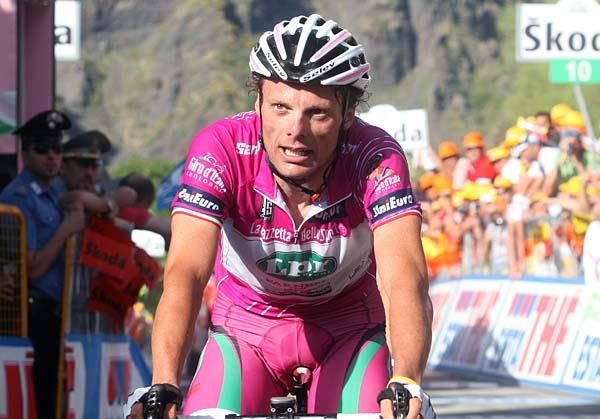Di Luca positive for CERA in Giro
(Updated) UCI provisionally suspends Italian after two positives

The International Cycling Union (UCI) announced Wednesday that it has suspended Italian Danilo Di Luca for two positive tests for the EPO derivative CERA.
The LPR-Brakes rider's doping control samples showed evidence of the banned blood booster on two occasions - on May 20 and 28th during the 2009 Giro d'Italia.
Di Luca finished second overall in the Giro to Russian Denis Menchov of Rabobank.
"These adverse findings were a direct result of a targeted test programme conducted on Mr Di Luca using information from his biological passport’s blood profile, previous test results and his race schedule," the UCI press release stated.
"This is further proof that the system works and we are determined to get rid of the cheats," UCI president Pat McQuaid told Cyclingnews' Shane Stokes.
Di Luca's first positive test came on stage 11 of the Giro the day before the decisive Cinque Terre time trial. The second positive came on stage 18, the day before the final mountain stage to Mount Vesuvius.
On July 13 Di Luca and UCI president Pat McQuaid openly denied the rider was under investigation for his biological passport results after a Spanish newspaper reported as much.
Get The Leadout Newsletter
The latest race content, interviews, features, reviews and expert buying guides, direct to your inbox!
It is the second time that Di Luca has come under suspicion of doping. He served a three-month suspension for involvement in the Italian "Oil for Drugs" investigation. He was suspended for working with a doctor who had been banned by the Italian federation.
It is still unclear as to whether or not Di Luca would face a possible lifetime ban for a second doping offence. "I’m not sure of the regulations on this but I don’t think it would count as a second offence. But that is for the legal people to determine," said McQuaid.
CERA, a more stable version of recominant erythropoeitin, was developed as a therapeutic agent to help anemic patients maintain a more table blood count than previous versions of the hormone which led to spikes and dips. Abuse of the drug by athletes was first detected in last year's Tour de France, when Italian Riccardo Ricco' was declared positive.
The French anti-doping agency AFLD pioneered the use of the CERA test to find several riders positive during or after the 2008 Tour. In post-Tour follow ups, Ricco's teammate Leonardo Piepoli, German Stefan Schumacher and Austrian Bernhard Kohl were also found to be positive for the substance.
Italian Emanuelle Selle was found to be positive for CERA in an out-of-competition test last year.
Schumacher and teammate Davide Rebellin were also caught in the CERA net when the International Olympic Committee re-tested samples from the Beijing Olympic Games and found them positive for the drug.
Before the Tour de France, the UCI announced the positives of several riders who it had targeted based on suspect profiles in the biological passport program. Riccardo Serrano and Inigo Landaluze have also been found positive for the substance this year.